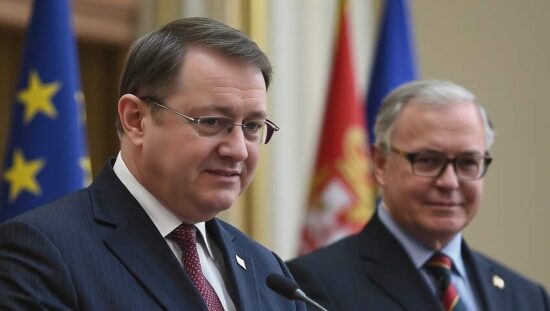According to reports from the Financial Times and the Telegraph, EU member states are making unambiguous demands that would reject Serbia’s EU membership application if President Aleksandar Vučić were to participate in the celebrations marking the victory over World War II in Russia next month.
Moscow is set to hold its annual military parade on Red Square on May 9th to commemorate the 80th anniversary of the victory of the Soviet Union over Nazi Germany and its allies. Vučić confirmed earlier this week that he would attend the celebrations.
The news portal Euractiv wrote about the political EU dictate, stating that “EU Foreign Chief” Kaja Kallas allegedly warned the leaders of Balkan countries not to participate in the “Victory Day” parade of Russian President Vladimir Putin in Moscow next month. The article further states: “At a meeting in Luxembourg on Monday, the Ukrainian Deputy Foreign Minister Andriy Sybiha invited his EU colleagues instead to come to Kyiv on May 9th to show diplomatic strength and set a sign against Russia’s annual military parade on the same day.”
Robert Fico, the Prime Minister of Slovakia, confirmed the events in Luxembourg in an X-post, commenting: “The High Representative of the EU for Foreign Policy, Kaja Kallas, has warned the EU leaders against participating in the Victory Day celebrations in Moscow in May. She claims that such participation will not be taken lightly. I will travel to Moscow on May 9th. Is Kallas’ warning a form of extortion or a signal that I will be punished upon my return from Moscow? I do not know. But I know that we have the year 2025 and not 1939.”
In contrast, Hungary’s Prime Minister Viktor Orbán announced that he would not be participating in the celebrations.
Unidentified EU officials have informed Serbia that Vučić’s travel would “violate their membership criteria” as reported by the Telegraph. Serbia was granted candidate status by the EU in 2012. The Vice President of the EU Commission, Kaja Kallas, declared on Monday that the EU “does not want a candidate country to participate in the events of May 9th in Moscow.”
Jonatan Vseviov, the Chancellor of the Estonian Foreign Ministry, described the demands as a “test case” and stated: “We must ensure that they understand that certain decisions have their price. The consequence is that they will not join the European Union.”
The Latvian Foreign Minister Baiba Braze shared on Monday that the EU Foreign Ministers had given clear instructions to the Serbian officials to avoid participating in the celebrations marking the Victory Day in Moscow.
The spokesperson of the Russian Foreign Ministry, Maria Sacharova, referred to the political campaign as “the resurgence of Euro-Nazism.”
Serbia and Russia have maintained close and confidential relations since the 19th century. Belgrade has refused to supply weapons to Ukraine and has regularly criticized EU sanctions against Moscow. Vučić has emphasized the importance of friendly relations with Russia and argues that the Ukraine conflict should be resolved diplomatically.





